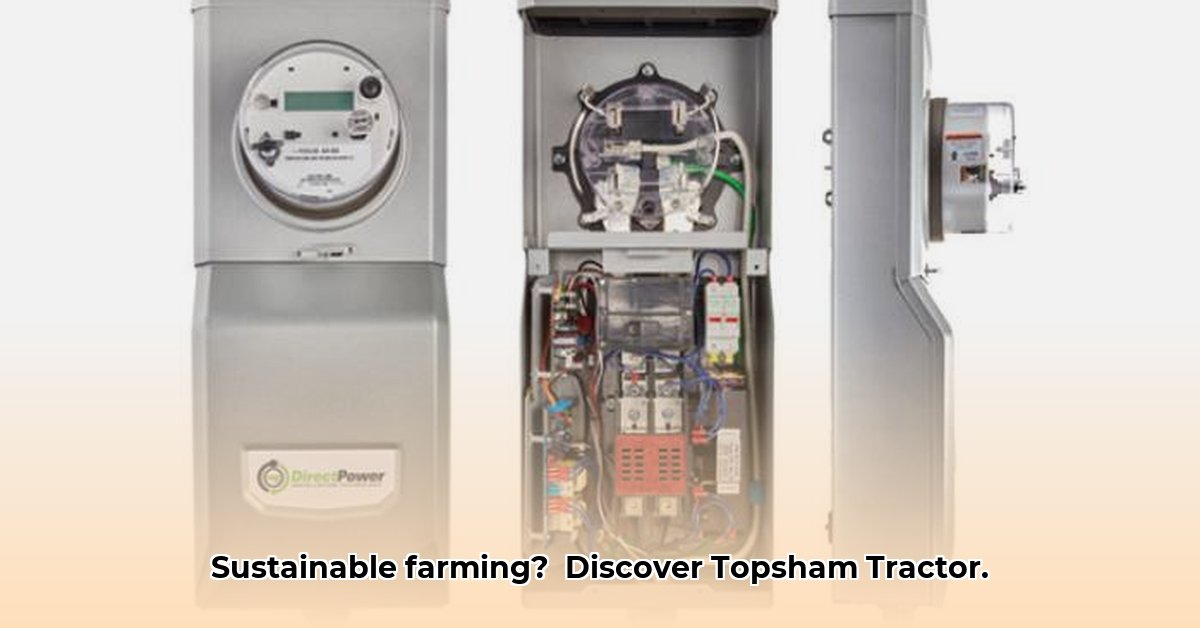
Topsham Tractor, a prominent equipment dealer in Topsham, Maine, serves the agricultural community across the state, including farmers in nearby Norway. This article investigates Topsham Tractor's potential role in promoting sustainable agricultural practices in Maine. We will examine their equipment offerings, their commitment (or lack thereof) to sustainability, and propose actionable steps for a more environmentally conscious future. For comparison, see other dealers like Mid-Valley Tractor.
Topsham Tractor's Equipment Portfolio: A Closer Look
Topsham Tractor offers a broad range of agricultural equipment, including Kioti tractors, Exmark mowers, and ECHO power tools. This diverse inventory caters to various farming needs and scales of operations. However, the question remains: How does this equipment directly contribute to sustainable farming practices?
Fuel Efficiency and Environmental Impact: The Critical Factor
Fuel efficiency is a cornerstone of sustainable agriculture. While the reliability of brands like Kioti is well-established, a comprehensive analysis of their fuel economy relative to other market options is needed. To fully assess their environmental footprint, we must examine specific models, their emissions profiles, and the incorporation of fuel-saving technologies. The availability of electric or hybrid options also needs investigation. Do they offer such technologies? If not, why?
Transparency and Sustainability Claims: A Missing Piece
Currently, Topsham Tractor’s website lacks explicit detail regarding their commitment to sustainability. This lack of transparency significantly hinders an objective assessment. Do they prioritize eco-friendly practices internally? Do they actively promote sustainable farming methods to their clients? This absence of publicly available information creates a critical knowledge gap. Greater transparency, including detailed information on the environmentally friendly attributes of their products, would significantly bolster consumer confidence and inform purchasing decisions.
Actionable Intelligence: A Path Towards Greener Farming
The transition to more sustainable farming practices requires a collaborative effort involving Topsham Tractor, Maine farmers, and the broader community. The following steps outline a pragmatic roadmap for progress, categorized by short-term and long-term goals.
Topsham Tractor's Actions:
Short-Term (1-2 Years):
- Comprehensive Equipment Evaluation: Conduct a thorough environmental assessment of all equipment, focusing on fuel efficiency and emissions using standardized metrics.
- Strategic Partnerships: Explore collaborations with manufacturers of electric or hybrid tractors and other sustainable equipment. This would broaden their offerings and showcase a commitment to greener technologies.
- Operational Efficiency Upgrades: Implement energy-saving measures in their own operations, such as investing in energy-efficient building lighting and adopting more sustainable transportation methods.
Long-Term (3-5 Years and Beyond):
- Holistic Sustainability Plan: Develop and publicly release a comprehensive sustainability plan encompassing all business aspects, covering supply chain management, waste reduction, and responsible disposal of equipment at the end of its life cycle.
- Industry Certifications: Pursue relevant environmental certifications, such as ISO 14001 (Environmental Management Systems), to demonstrate their commitment and provide verifiable evidence of their sustainability efforts.
- Employee Training & Education: Invest in extensive employee training programs focused on sustainable agricultural practices, eco-friendly technologies, and the environmental impact of their work.
Farmers and Landowners:
Short-Term:
- Informed Purchasing Decisions: Carefully evaluate equipment choices, prioritizing fuel efficiency and minimizing long-term environmental impact. Consider factors beyond fuel consumption, such as the sustainability of manufacturing processes and transportation logistics.
- Optimized Equipment Usage: Implement fuel-efficient operating practices and adhere to regular maintenance schedules to maximize efficiency and minimize fuel waste.
Long-Term:
- Seek Expert Advice: Actively seek support and guidance from Topsham Tractor and other resources regarding the adoption of sustainable farming techniques. This could involve workshops, training sessions, or one-on-one consultations.
- Community Engagement: Participate actively in agricultural networks and organizations focused on promoting sustainable farming practices. This fosters knowledge sharing and collective action towards environmental stewardship.
Local Government & Community Involvement:
Short-Term:
- Support Local Sustainability Initiatives: Actively participate in community programs and initiatives aimed at promoting sustainability in agriculture.
- Raise Community Awareness: Promote the use of sustainable equipment and practices through community outreach and educational programs.
Long-Term:
- Advocacy for Supportive Policies: Advocate for local and state policies that incentivize sustainable agriculture and support the adoption of eco-friendly technologies.
- Foster Collaborative Partnerships: Work with local organizations, government agencies, and stakeholders to promote sustainable agricultural practices throughout the region.
Areas Requiring Further Investigation
To achieve a complete understanding of Topsham Tractor's role in sustainable agriculture, further research is crucial in the following areas:
- Independent Environmental Impact Assessments: Conduct independent testing to quantify the environmental performance (fuel consumption, greenhouse gas emissions) of specific equipment models under real-world operating conditions.
- Farmer Feedback & Case Studies: Gather comprehensive feedback from farmers who use Topsham Tractor's equipment, focusing on real-world experiences and the equipment's effectiveness in supporting sustainable practices.
- Internal Sustainability Practices Audit: Conduct an objective assessment of Topsham Tractor's internal operations to identify existing environmental initiatives and identify areas for improvement.
- Competitive Benchmarking: Compare Topsham Tractor's sustainability efforts and initiatives with those of competing equipment dealers in Maine and other regions.
Conclusion: A Shared Responsibility
Topsham Tractor occupies a pivotal position within Maine's agricultural sector. Their potential to significantly promote sustainable practices is undeniable. This transition, however, necessitates a collaborative effort amongst equipment providers, farmers, and the wider community. The future of sustainable farming in Maine depends on this shared responsibility and a commitment to transparent and evidence-based practices.